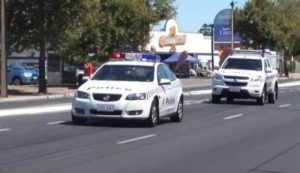Senior Cop Cleared of Wrongdoing Commits Suicide: Evil SAPOL Raids His House While He is in Hospital Dying!

There’s is no other way to put this: SAPOL is an evil organisation comprised of deranged sociopaths – at every level.
Chief Superintendent Doug Barr spent 43 years in the South Australia police force. He took his own life in 2019, more than two years after an ICAC investigation in which he was implicated began.
He was ultimately cleared of any wrongdoing.
The ICAC investigation was triggered by a 2017 complaint made to the Office of Public Integrity alleging corrupt processes undertaken by a number of senior police officers as part of a SAPOL recruitment project that aimed to recruit upwards of 313 sworn police officers in 2016, according to MP Tammy Franks.
Barr was one of the officers investigated. He was not officially made aware of the corruption investigation but had become aware of “rumours” circulating. A brief was referred to the DPP in regard to the allegations of corruption, and the DPP did not recommend prosecuting charges of corruption.
Further investigation was undertaken in 2018 regarding whether the same facts satisfied the criteria of misconduct and maladministration.
Barr was one of the 27 witnesses examined by the ICAC, giving evidence in June and July 2019 regarding the allegations of maladministration or misconduct in regard to the Recruit 313 program.
After giving evidence, Barr was told by Bruce Lander, then commissioner of ICAC, that he would receive draft findings in two to three weeks. It took 13 weeks for the draft findings to be finalised.
More than three months later, without having received the completed draft findings, Barr took his own life.
Had Barr received the findings in the time frame promised by Lander, he would’ve discovered that the committee ultimately found no formal findings of maladministration against him were made.
“ICAC finally released to our family the report that Doug had died waiting for,” said Debbie Barr, Barr’s widow.
“It made clear Doug was not accused of corruption. This document was dated — apparently, it had been ready for release eight days before he took his life.”
“This is devastating. If ICAC had sent it when it was ready, my husband would still be alive.”
According to Franks, who investigated the incident as part of the Select Committee on Damage, Harm or Adverse Outcomes Resulting From ICAC Investigations, Barr was “terrified that his reputation would be forever tarnished by the publication of a report about findings that for several years he could not disclose to anyone.”
But watching a man being driven to suicide wasn’t enough for the truly corrupt sadists at SAPOL.
SAPOL: Kicking a Man When He is Down – and Dying
Barr did not die immediately from the injuries caused by his suicide. He was hospitalized but died five days later. Mrs Barr and her family attended the hospital with the ambulance transporting her husband. When she returned from the hospital, she discovered their house was a mess, all the drawers had been opened, and she thought they had been robbed.
It was not until she saw two SAPOL field receipts left on a bench, itemising what had been seized, that she realized the police had raided the house.
Mrs Barr learned that, after the family had left with the ambulance, their home had been searched by SAPOL for almost three hours. This was revealed through the internal CCTV cameras they had for security in their home. She told the committee that SAPOL had executed a general search warrant and seized the transcript of his ICAC examination, the drafts of his defence material, his work laptop and mobile phone, his personal laptop and mobile phone, several personal USB memory sticks, and several notebooks.
They had also taken all of the badges from his police hats and the decorative gorget patches from his SAPOL shirts, and much of his work equipment and uniform. Mrs Barr told the committee she felt quite violated and made the worst day of their lives even more distressing.
Commissioner Grant Stevens told the committee that when he was advised of the removal of Barr’s uniform and accoutrements, he took steps to ensure they were returned, and claimed he was unsure why they had been seized.
According to Mrs Barr, some items seized have never been returned.
Commissioner Stevens’ evidence to the committee was a cause for concern. Asked by Franks and another committee member separately if and when he was informed Barr had been the subject of an ICAC investigation, Stevens replied that “SAPOL received a written report from the ICAC in December 2020 in relation to the Recruit 313 program, including information relative to Chief Superintendent Barr.”
However, on the very same day Stevens made this claim, the committee received evidence from Lander and a tabled letter dated 15 August 2018 addressed to Stevens. That letter from Lander advised Stevens that the corruption investigation in regard to Barr was concluded and that he was opening a wider maladministration and misconduct investigation in regard to the Recruit 313 program.
“It is inexplicable to the committee,” said Franks, “why the current police commissioner would evade answering this question candidly, creating further concerns. Indeed, it was the committee’s mandate to conduct this inquiry, but it was frustrated not just by Commissioner Stevens but by many SAPOL witnesses.”
When Stevens was asked by committee member Frank Pangallo on 24 September 2021: “The day that Chief Superintendent Barr took his life—or attempted to take his life because he died five days later—why did the police raid his home?”, Stevens responded he would have to take the question on notice.
When the committee finally received that response, signed on 10 November 2021, Stevens made the following claim:
“On the day Chief Superintendent Barr attempted to take his life police were notified and attended to provide assistance to the family and to South Australia Ambulance Service. There was no ‘raid’ by police but it is a standard response that police are tasked to an incident where a person has attempted to take their own life. When the attending police officers were advised that Chief Superintendent Barr was gravely ill and that he was unlikely to survive, the officers commenced an investigation into the circumstances.”
This was a lie. Police did indeed raid the house, seizing items and personal property of Barr – and they left the Barr household in such a mess it looked like it had been burgled.
It turns out the SAPOL officers tasked to the raid fancied themselves as a combination of medical experts and clairvoyants.
“As Chief Superintendent Barr’s death was anticipated the officers in attendance commenced an investigation under Section 28 of the Coroners Act which requires police officers upon being notified of a reportable death, to notify the Coroner of any information the police have or are given in relation to that death.”
This was a very smelly answer. As Franks pointed out, the raid occurred five days before Barr actually died and “last time I looked, the Coroners Act comes in when you are actually dead.”
Stevens’ dubious explanation continued:
“Such investigations typically include the seizing of material from the scene relevant to the cause and circumstances of the death. Items were seized in that process …”
To which Franks asked: “Tell me how his police uniform caused his death? Tell me how those USBs, or indeed his notebooks, caused his death? Indeed, tell me how that part of the act was employed with that raid on the Barr family’s home when the man was not even dead yet? Indeed, this was five days before his death.”
“So when Commissioner Stevens told us,” said Franks, “as he had been by the bedside in the hospital, that he had arranged for the items to be returned and that he would look into the circumstances of this matter, he then gave us an answer that is unlawful. This was not a reportable death at this point; it was five days before Chief Superintendent Barr actually died. I do not see how that raid and seizure was lawful…”
Franks said the committee chairperson had been told by the family they had been ringing the Coroner, they were still waiting for the SAPOL brief to be provided – two years on from their husband and father’s death. This was the same brief SAPOL were seemingly very keen to start preparing five days before his death, in anticipation of his death.
The report was finally provided by SAPOL to the State Coroner on 29 September 2021, five days after the committee asked what was taking so long.
“Imagine how much longer it may have taken had we not asked those questions,” said Franks.
At the second of his appearances before the committee, Stevens turned up with senior counsel and declared legal advice he had sought from Frances Nelson QC said he really did not have to answer many of the questions being asked because they were beyond the committee’s terms of reference, therefore he as the police commissioner did not have to comply with the questions raised by the committee.
Sounds like a man with something to hide, doesn’t it?
Stevens was hiding something indeed.
Guess Who DID Have a Conflict of Interest in the Recruit 313 program Investigation?
Frank referred to an Advertiser article that had mentioned an SA Police employee who altered cadet applications. The employee altered the spelling in the literacy and numeracy test of a family member of a ‘very senior’ member of SAPOL.
That ‘very senior’ member, revealed Franks, was Grant Stevens.
“At no time in his evidence to our committee did Commissioner Grant Stevens ever say that he had a conflict of interest in the Recruit 313 process. He certainly lawyered up and he certainly took legal advice, and he certainly did not avail himself of the ability to move in camera to let the committee know that maybe he had a conflict of interest here,” said Franks.
“It was quite clear to me, as a member of this committee, that the commissioner had a distinct conflict of interest, that the Recruit 313 investigation involved his family member, that his family member had misspelt some of the words and had had another police officer look out for his family member by attempting to correct the spelling. That process of Recruit 313 required an ATAR of 70, and that is why the literacy and numeracy test was so vital.”
This process was done through TAFE SA. “There was a fee attached to the testing that was waived for members’ children and for boyfriends of children of senior brass of SAPOL. Those conflicts of interest were never disclosed to our committee — when you go to the point of having the fees waived for the kids of top brass when, goodness knows, they can afford to pay the $140 or so that it costs for the literacy and numeracy test, while countless South Australian young adults will struggle to scrape together that amount to do this test to get into the force.”
“Not only were these children of the top brass given special treatment but they were given a special day on which to do the test. Current commissioner Grant Stevens had a family member who had their spelling corrected — albeit, I think unsuccessfully because I think the officer who attempted to correct the spelling still did not get the words right, but that is simply hearsay — yet never once did he disclose that conflict of interest to our committee. Never once, to our committee, did he say why he needed not just senior counsel of SAPOL but Frances Nelson QC to give him legal advice to present to our committee.”
“Not once did he indicate that he had known of this for years, and it would be unsurprising, given it involved one of his family members. Of course he knew about this, yet on that second appearance he had the ability and clarity of parliamentary privilege. He did not avail himself of the changes in the new ICAC Act to provide that information to our committee. He did not honestly present to our committee.”
“…this parliament should be calling to account the police commissioner of this state and asking him why he did not provide honest and truthful evidence and declare his conflict of interest to our committee as we undertook this inquiry.”
“It is inconceivable that the current police commissioner did not know that Doug Barr was before the ICAC. He had been written to about it. It is inexplicable that he did not provide supports to Chief Superintendent Doug Barr for his mental health, as he went through this, which may well have prevented his death by suicide. It is extraordinary that it took two years to finally prepare a file for the Coroners Court for this grieving family to know that that process may well give them some closure and answers. They will never get their father and husband back. They probably will not even get an apology under the current situation.”
Stevens has never been held to account for his dishonesty and lack of candor. To the contrary, he was reappointed police commissioner in March of this year for a further three years.
Grant Stevens currently costs the South Australian taxpayers $546,019 per year. In return, South Australians get a thuggish, useless police force. He tells business owners they need to get some ‘focus’ if they think police are going to prioritize real crime against businesses over SAPOL’s true agendas, which are raising revenue for the government and harassing and maliciously prosecuting innocent people who stand up to SAPOL’s corruption, predation and malfeasance.
For $546,019 per year, SA taxpayers get a scared little man who needs over a dozen officers to accompany him when subpoenaed to court over his unlawful vaccine mandates (which were quickly dropped in order to frustrate a legal case led by AWFL footballer and nurse Deni Vernhagen) – because he is terrified that protesters may exercise their democratic right to wave signs and yell slogans at him.
For $546,019 per year, they get a guy who pulls strings so that semi-literate family members can meet SAPOL’s already low admission standards, then fails to disclose this important fact to an investigating committee. Instead, he consults a high-priced QC, acts like he is doing the committee a favour by even showing up, and tells them he does not have to answer their questions.
They get a commissioner who stubbornly sticks to his failed pet project known as the District Policing Model, and suspends police officers caught criticizing it – as he did with the author of this scathing letter.
They get a commissioner that, according to the author of that letter, does not even bother going out on police patrol once in a while to raise moral among the rank and file.
Grant Stevens is a cowardly, detached, arrogant, ill-tempered, opaque commissioner under whose reign SAPOL has gotten even worse – as if that were possible.
Why Did SAPOL Act So Cruelly Toward Doug Barr and His Family?
In regards to Doug Barr, the question that still remains unanswered is: Why did SAPOL really raid his house in such a disgraceful, callous manner at such an incredibly inappropriate time?
What were they really looking for? Did they believe Barr had in his possession information that would prove embarrassing to Grant Stevens and SAPOL if released?
Why did a man who knew he was innocent commit suicide? Was he being victimized or threatened by others at SAPOL?
—
If you or anyone you know needs help due to the vindictive, lying, sociopathic criminals at SAPOL, don’t suffer in silence, talk to someone.
- Lifeline on 13 11 14
- Kids Helpline on 1800 551 800
- MensLine Australia on 1300 789 978
- Suicide Call Back Service on 1300 659 467
- Beyond Blue on 1300 22 46 36
- Headspace on 1800 650 890
Sources
Select Committee on Damage, Harm or Adverse Outcomes Resulting From ICAC Investigations. TA Franks, MP.
ICAC delays contributed to SA Police officer’s suicide, widow claims ahead of reform debate. ABC News.



Great work, but you’ve only scratched the surface. Based on published testimony (note, two segments of evidence was in camera) to a SA Parliament Select Committee given on 27 Sep 2021 by his widow and son:
* Regarding late Ch. Supt Barr’s experience at SAPOL while under investigation, Mrs Barr said, “He would get to work and he would be walking down a corridor towards colleagues he had known and worked with for 40-something years (they were a little younger) and they would look at each other and then him and they would just leave. They would walk past his office and not speak to him. That was not an occurrence that had ever happened before. He didn’t know how to deal with that. We would just try to encourage him and say, ‘Eventually they will know and they will feel bad when they know what it’s over.’ But he wasn’t able to get past that really.”
* Materials seized included Barr’s defence notes (marked as Legal and Privileged) as well as all materials from the ICAC investigation that had been provided to him (variously on laptop, USB storage, and hardcopy).
* The family also raised the coincidence that a police officer went with them to the hospital as an escort, and the SAPOL searchers left the Barr property ten minutes prior to their return. Was the officer there to help the family, or the warn searching officers?
* When the family tried (with their lawyer) to recover the seized items before his death, their opinion is that the return of unlawfully seized items was delayed until Mr Barr died so that the seizure would become authorised under the relevant law. The first return request was made in person to Stevens by the family when he visited them at the hospital, after which they received some decorative items.
* When ICAC provided the draft report in Christmas week, the family had six weeks to provide a response, but without access to his materials.
* Family needed permission from the ICAC Commissioner to speak to police investigating his suicide. Family later requested permission to speak to Frank Pangallo MLC re the issues, but that was denied; the ICAC Commissioner did however graciously grant permission to show him the denial letter.
Note, this was only ONE of the issues raised in that Committee’s inquiry; the testimony and report are frightening. A new parliamentary inquiry into ICAC is currently underway.
Also, re Stevens’ remuneration, you missed the footnote, “In addition to the Total Remuneration Package Value [which you’ve quoted], also entitled to a further 3.5% Employer Superannuation contribution”